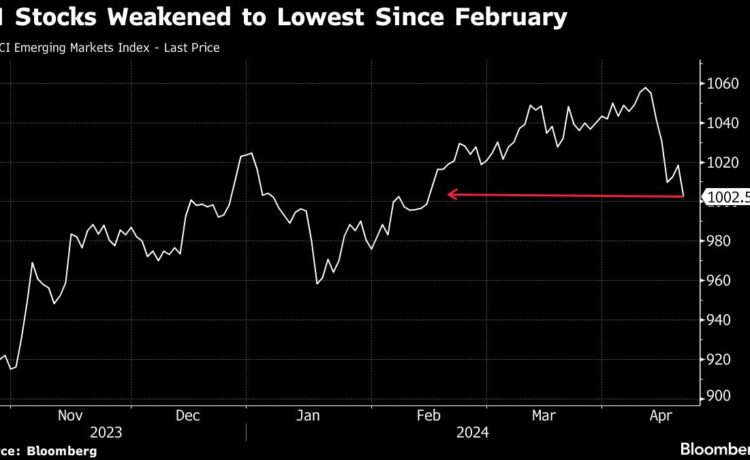(Bloomberg) — Gauges for emerging-market stocks and currencies slipped Friday as risk assets took a hit from the latest flare-up in Middle East tensions.
Most Read from Bloomberg
The foreign-exchange index touched the lowest level this year after Israel reportedly struck back at Iran, according to two US officials. It’s since pared losses as the risks seemed contained. The shekel was up 0.8% after having weakening just as much earlier.
Mexico’s peso — widely considered a proxy for risk assets — plunged the most in four years on the reports, though it later reversed most of that slump as media from both countries appeared to downplay the severity of the incident. Renewed geopolitical concerns and uncertainty over interest-rate cuts in the world’s largest economy have battered developing-world assets this week, with the MSCI gauge for emerging-market stocks posting the worst weekly slump since June.
“The combination of the Fed sending a hawkish message and the risk of higher oil due to tit-for-tat responses between Iran and Israel feed on each other,” said Rajeev De Mello, a global macro portfolio manager at GAMA Asset Management. “If the escalating tensions result in oil breaking the psychologically important 100 level, central banks will have no choice but to retreat from their hints about cutting rates.”
Read more: IMF’s Gopinath Warns Mideast Escalation Will Test Oil Buffers
The largest US-listed exchange-traded fund tracking emerging markets, VWO, fell 0.3%. And while the gauge for Latin American stocks climbed, the broad equity index — which is heavily weighed to Asia — sank to a two-month low.
Latin America
The Mexican peso at one point slumped nearly 7% on the news of the attack on Iran, and though it trimmed losses later, a measure of implied volatility in the currency hovers at the highest since October. High interest rates had made the currency a favorite for carry trades, which traders have unwound on the wild price swings in recent sessions.
“Mexican peso flash crash highlights how susceptible the MXN can be to risk-off episodes and external conditions,” Rodolfo Ramos, a strategist at Bradesco Securities, wrote in a note Friday. “We prefer to hedge our bets.”
Read more: ‘Super Peso’ Slides as Middle East Risk Threatens Carry Trade
Elsewhere in Latin America, the Chilean peso and the Peruvian sol were the biggest gainers for the session as copper prices advanced. Though the peso has strengthened this week, it remains the worst emerging-market currency after the Turkish lira this year, battered by steep interest-rate cuts.
The Brazilian real was the third-biggest gainer after local media reported the government is likely to favor distributing all of the state-owned oil driller’s dividend, improving the outlook for government revenue. Earlier in the week, the currency slid on fiscal concerns.
Read more: Latin America Sees Low-Rate Dreams Crumble, Political Woes Rise
Even amid elevated geopolitic risks, the International Monetary Fund sees price pressures in much of the Middle East and North Africa easing despite the fallout from the war in Gaza and shipping attacks.
Investors and top economic policymakers gathered in the US capital this week for the IMF’s spring meetings, which stoked optimism over Latin America’s weakest bond markets. Debt from Argentina and Ecuador outperformed this week as officials emphasized their commitment to market-friendly policy. Still, Ecuador bonds trimmed some gains Friday ahead of a key referendum this weekend.
Read more: Top Emerging Market Bond Rally Tested in Deja Vu Ecuador Vote
Meantime, bonds from Ukraine led losses Friday, adding to their weekly plunge ahead of a potential debt restructuring. Debt from Panama also sank this week as money managers see a bleak outlook for the country, which is holding a presidential vote next month and shut down a $10 billion copper mine recently.
Read more: IMF Confident Worst of Inflation Is Over for Mideast Despite War
–With assistance from Carolina Wilson.
Most Read from Bloomberg Businessweek
©2024 Bloomberg L.P.















